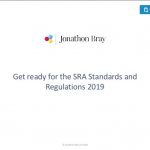It’s finally here, launch day for the SRA Standards and Regulations. Are you ready with your party poppers and fanfare?
The new rules have been talked about ad nauseam over the last few months. Hopefully now we can shift our focus to some more pressing compliance and risk topics. Such as:
- AML, particularly with the SRA’s renewed focus, and the 5th Money Laundering Directive almost upon us (January 2020), is the big topic for most law firms. Many are scrambling around to get their systems in place before the regulator comes knocking.
- Brexit could still be an issue for many cross-border firms, or those who send or receive data from the EU.
- Fraud and cybercrime targeting solicitors gets more sophisticated by the day.
And yet much of our attention has been focused on the SRA’s new rulebook.
We’ve said it before, but it’s worth repeating: Don’t panic
Yes, it is important that all regulated people are aware of the new rules. We need to do the training. (Reminder that all our retainer and ABS clients have access to the staff e-Learning module in your compliance portal).
And yes, there are some changes – some quite subtle and unintentional, others less so.
But the main theme of the new rules is evolution not revolution. Simplicity and flexibility over poorly drafted Outcomes and Indicative Behaviours. And taking the next logical step on the Principles Based Regulation journey.
The biggest changes in the rules are:
- The radical new ways of practising outside of full regulation
- A significant emphasis on ethics and individual accountability over ‘compliance’
- Wonderfully accessible and sensibly-drafted Accounts Rules
The rest is mainly either subtle change in rules, or simply changes in format.
Even the regulator’s message has been that ‘compliance’ on 25th November will look the same as today. We shouldn’t need to be making wholesale changes to internal systems and processes.
Instead, we need to increase our focus on:
- Taking personal responsibility for our own ethical behaviour – both in and out of the workplace
- Being less reliant on prescriptive rules, and being able to justify our decision making
- Keeping records to demonstrate compliance
- Understanding rules that apply to us – for example, the Accounts Rules (which are now accessible to all)
- Reporting our concerns internally and – where necessary – externally
- Understanding that supervisors carry a regulatory responsibility – they are accountable for the work of those they supervise
- Minimising the risk of working with the ‘new breed’ of solicitor – the freelancers and those working for unregulated businesses.
- Getting used to keeping a close eye on regulatory guidance.
As with all matters of regulation, if you can demonstrate that you are taking steps to engage with the rules, the likelihood of you being criticised is low. On the other hand, those who are unable or unwilling to take reasonable steps towards compliance are putting themselves at risk.







